- Home
- Chris Ryan
One Good Turn
One Good Turn Read online
Annotation
In 1917, Western Front, Ypres, a soldier wakes up in a damp, dark basement. He can't get out. He is covered in mud. His skin is badly burned. And he can't remember anything. But his nightmare doesn't end there. He is tried and found guilty of cowardice, impersonating a fellow soldier and theft. He can barely speak, let alone defend himself. As the verdict is passed and he learns that the death sentence awaits him, he remembers two things: that he took something from a dead man in the trenches, and that the name his accusers have been calling him is not his. With time slipping away, Chris Ransom must try to remember the events that have led him to this moment, so that he can clear his name and save himself.
* * *
Chris RyanChapter One
Chapter Two
Chapter Three
Chapter Four
Chapter Five
Chapter Six
Chapter Seven
Chapter Eight
Chapter Nine
Chapter Ten
Chapter Eleven
Postscript
* * *
Chris Ryan
One Good Turn
Chapter One
The man hurt in his dream and he hurt when he woke.
He was lying on a metal bed frame in a dark cellar. He was cuffed to it by the wrists and ankles. High up towards the ceiling, a cracked airbrick let in a little light so that he could see the bare walls, piles of rotting furniture and a wine rack along the far wall. The floor was puddled with water and the man could hear things running around in it.
Something moved at the bottom of the bed. Before he could react, a weight moved up his leg and onto his chest. He lifted his head and saw a big, greasy rat squatting on him. He bellowed and threw himself from side to side. The rat flopped off onto the wet floor.
He didn't go to sleep again. His head was splitting. The rats were everywhere and behind their grunting and scratching he could always hear the guns.
Crump. Crump. Crumpcrumpcrumpump-mpmpmpumpcrump. Crump. Crump.
That sound came from the big French guns down the line. You didn't just hear them. You felt them loosely in the gut.
The war taught you to recognise the different guns.
Eighteen-pound field guns went whizzzzz-BANG, depending on how close they were to the target. Once you heard the whizz, there wasn't much time till the bang. The German field guns sounded the same.
Mortars, which lobbed bombs high in the air to land on an enemy's head, made three distinct noises. POUM as the round was launched, EEEEEEE as it flew through the air and CRACK as it landed.
The big shells, the Pissing Jennies or Whistling Percies, screamed, then cracked the heavens open when they burst. They came from the heavy artillery as far as six miles behind the lines. A big gun might fire a sixty-pound shell but they were tiddlers compared to the big howitzers. These massive weapons slid along on special railways and fired 700-pound rounds.
His personal nightmare was the enemy's Mil mortar — a huge brute that fired an 850-pound shell, practically the weight of a horse. The Ml 1 could blow a hole through four feet of reinforced concrete, or make a crater twenty-five feet deep. When you heard one of those screaming overhead, you knew men were going to die. Because the British Army thought concrete protection was cowardly and, anyway, you couldn't dig more than eight foot down into the Belgian mud without drowning.
The sound of one shell bursting was bad. Two was enough to bring tears to your eyes. Bombardments could often last for hours — days even — with the shells bursting every few seconds.
It was odd that he knew these things but did not know who he was. It was odd that the bed had no mattress and he was lying on its metal base. And it was odd that he was cuffed at the head and the feet so he could not move. In fact, everything was odd.
He heard a scraping sound and turned his head.
Christ, that hurt. His skin felt as if it had been scoured with sand and then dried until it cracked. His head was splitting. His jaw was loose. His tongue felt rough stumps where teeth should be. The entire length of his back felt raw. And the rawness went all the way down the backs of his legs. A distance away and above him, light flared as the cellar door opened.
A figure appeared, a dark shape against the light, and footsteps sounded on creaky wooden stairs.
'Mate. Mate,' he called out hoarsely. 'What's going on, mate?'
The voice was cold and cruel. 'Don't "mate" me you horrid little man.' A face loomed over him, twisted with hate. "You're lucky you weren't shot on the spot."'
The man watched as the figure turned, pulled a bottle of wine from a rack and left. The man on the bed started to cry. That was odd too. He cried himself back to sleep.
He dreamed he was up to his neck in filthy water in a shell hole with sides of slippery clay. He was holding onto what he thought were tree roots, but when he looked again, he saw they were human limbs. The thirst was torturing him, but he couldn't drink because the water was a stew of rotting flesh and mud. He felt movement near him in the water and a body bumped up against him, swollen by the gas of rot.
He held his breath and sank down. Immediately he was lost in a chaos of twisting guts and grasping hands. They felt round his neck. They felt in his pockets. He tried to kick himself free, but every time his face broke the surface he was dragged down into filth. He opened his mouth to shout but a hand clasped his mouth. Tighter. Tighter. Tighter.
He woke up to find a lantern shining in his face, a hand over his mouth and a rough voice telling him to shut up. The ties were taken off his wrists, and he was made to sit up.
'What's going on?' he whispered. He was so thirsty he could hardly speak.
'Scrubbing you up, mate.' An impossibly clean sergeant stood by the bed. Behind was a corporal with his Lee Enfield rifle at the ready.
'I'm thirsty.'
'All in good time. Here. Wash your face, then wash your hands,' the sergeant said.
'Tell me what's going on. Please.'
'You're a prisoner — that's what's going on. Now get a move on.'
A bowl of soap-scummed water was put in his lap but, instead of washing, the man dipped his face into it and drank. It was beautiful — the best thing he had ever drunk in his life. Only then did he splash it on his face. As the water grew steadily more filthy, he felt as if were washing away some of the horror.
'Now, you're a pretty boy again, we'll take you upstairs,' the sergeant said. 'My advice is to say as little as possible. It'll only piss them off.'
But when the man tried to stand he fell over. So he was supported by two privates up the stairs, down a dark corridor and into a long, cold room which was so full of light it hurt him. Through his tears, he saw three men sitting at a table at the end of the room, and felt himself being carried towards it.
'Why are you holding him up, Sergeant?' a voice snapped.
'He's prone to falling over, sir.'
'Nonsense. This is a field court martial, not a bloody rest home. He's a little coward with no spine. Let go of him, and if he falls, stamp on his hand or foot or something until he stands on his own. Christ and all the angels, he stinks! Let's get this over and done with.'
The sergeant put a chair in front of him. He leaned his weight on the back of it, and stared at the three officers who sat behind the long trestle table straight ahead. From their expressions, they didn't much like him. The lieutenant on the left had slicked-back fair hair, a thin moustache and looked younger than him, but then you could never tell with officers. The officer in the middle, a major, was balding and red-faced with heavy jowls. The officer on the right, another lieutenant, had a centre parting, a monocle and looked appalled.
The man did not grasp anything that followed. It concerned a man called John Stubbs and he didn't see w
hy that should bother him.
'Right,' the major said. 'Let's get this going. Which of you is going to be the prisoner's friend? Hmm. Lieutenant Burton — I'm appointing you. Has the prisoner had time to prepare his defence?'
Lieutenant Burton, the one with the monocle, said: 'When was he arrested, Sergeant Major?'
'Two days ago, sir.'
'Plenty of time then,' the major said. 'Prisoner, I'm the president of this court martial. Lieutenant Burton is referred to as the Prisoner's Friend, which means he's defending you. Lieutenant Carpenter here is prosecuting. Is that clear? Good. As the president of the court, I run things. Now, I'm going to read out a list of charges and then you tell us whether you want to plead guilty or not guilty. Is that clear? Good. Right.'
He looked down at a piece of paper on the tablecloth in front of him and read from it. 'Your name is Private John Stubbs of the London Battalion, Royal Fusiliers, 58th Division, etc, etc. The charges as they stand are that on the 23rd of September in this year of Our Lord nineteen hundred and seventeen, you did wilfully attempt to injure yourself to avoid discharging your duty as a soldier. At some point later in the day, you did steal from a fellow soldier leave papers and identification in order to impersonate same soldier. In other words you are a thief and a coward. How do you plead?'
The man was aware that all the officers were staring at him. He smiled at them vaguely.
'The man's an idiot,' the major said. 'Lieutenant Burton, will you enter a plea, as the prisoner's friend?'
'Guilty,' the lieutenant said.
'Very well.' His pen scratched slowly across the paper. 'Urn, Lieutenant Carpenter, can you take the court through what happened in greater detail, as it will have some bearing on the sentence? And for God's sake talk slowly and keep it brief because I've got to write it all down.'
The officer started talking about the war, but the prisoner was not interested in that any more. He was staring at the view outside the high windows. Heavy rain in northern Europe had made the summer of 1917 one of the wettest on record, but today the sun was out. The flowers in the overgrown beds glowed brightly. Rooks circled the crown of a huge chestnut tree. Beyond the garden, a wheat field was turning gold. Next to the wheat was a green meadow where a brown cow with gentle eyes rubbed its neck on a gate. And above it all, white clouds drifted peacefully across a pale blue sky.
To the prisoner, the view outside the window was like medicine. For almost a year, he had been frightened of the sky because of all the awful things that fell out of it: shells, poison gas, or more of the dreadful, smothering rain.
The only bright colours he had seen had been the acid white of flares, the dirty yellow of shell bursts, the crimson brightness of blood and the purple of spilled guts. The only trees he had seen were blasted stumps. The only fields he had walked on had been turned into a sucking, poisonous soup of brown mud by years of bombing. The only harvest from these fields were the bodies of his comrades and enemies, mown down by machine guns, buried by mud, blown up by shells, buried again, blown up again.
The sergeant was bellowing in his ear.
'Have you got anything to say, Private? Answer the court!'
'I'm so sorry,' the man answered. 'About what?'
'This is the clearest case of contempt I have ever seen,' the major said. 'I've never seen the like. At present we have no findings to announce. We will be taking evidence with regard to the prisoner's character. But in my opinion, Private Stubbs, you are a thief, a coward and quite possibly a murderer. Unless defence has anything to add, I now pronounce the proceedings in open court to be over.'
It was only as he was being marched out that the penny dropped. He was John Stubbs. That seemed to be the gist of it. And if he were John Stubbs, then he had done all those terrible deeds.
What strength he had left his legs again and he collapsed.
'Pick him up, lads and get him out,' the sergeant said. The prisoner was lifted up again by the two privates and they began to drag him out of the room. At the door he managed to turn his head.
'Wait,' he said. 'Wait! There's been a mistake! I'm not John Stubbs!'
He expected the world to stop but the three officers who had been seated at the table ignored him. The prosecutor and the court president were talking and the other, his defender, had got up. Now he was standing at the window, whacking his riding boots with a crop. He stopped, put his monocle back into his eye and looked at the prisoner.
'Are you saying we've been wasting our time?'
'Yes! No. I don't know.'
'What are you saying then?'
'Just that you've got the wrong man.'
'Who on earth are you then?' the officer asked.
The prisoner shook his head. 'I can't remember.'
The officer laughed like a horse. 'Well, you'd better try. Because if you're not John Stubbs, I don't know who is.'
Chapter Two
John Stubbs saw the Chinese sailor weaving his way down Tooley Street and smiled to himself. Funny the things that you saw these days: women making bombs in factories all day, and drunk Chinamen in the middle of London on a Saturday morning when all God-fearing men and women should be serving King and Country — or taking it easy.
Not that anyone seemed to take it easy in the Great Port of London. For mile upon mile, the riverbanks were lined with great cranes and towering warehouses, deep docks and busy wharfs. From Tower Bridge to Greenwich, from Wapping to the Isle of Dogs, the Port of London was a vast throat that swallowed everything that came its way: food, timber, cloth, coal, iron — anything that the capital of the British Empire needed. And now the Empire was at war, and had been for two years, it was incredible what passed through the Port of London. And what opportunities there were for natural crooks like John Stubbs, native of Whitechapel, prize conman and thief.
Stubbs looked up and down the street. It was early and not yet busy. A potboy was sweeping the sawdust out of a pub down the road. A market trader had just come from Borough Market, his two-handed cart piled high with cabbages. Two clerks, neatly dressed in suits and bowler hats, walked into Hay's Wharf, where, they said, all the tea in China was stored.
Stubbs wondered why they weren't in the army. Whatever the papers said, the war in France was going badly. When it had started two years ago, the papers had boasted that one knockout blow would stop the Hun in his tracks. The second blow would send him reeling back out of Belgium, back out of France, all the way to Germany.
As far as Stubbs could see, they had got it all wrong. The war wasn't like a boxing match fought according to the Queensberry Rules. This was a street fight with two punch-drunk idiots going at it in the mud: both too stubborn to give up, neither strong enough to win.
Sign up now, people had said. If you delay, the war will all be over and you'll miss the fun.
Men had signed up in their thousands, queuing in some places to make sure they were on a troopship to France and Belgium as soon as possible.
Where were they now?
Dead. Blown to bits by shells, hung up on barbed wire, cut in half by machine guns or drowned in the sodden trenches.
Stubbs knew this. He talked to the soldiers on leave as they spilled out of the stations at Waterloo and London Bridge, their pockets full of back pay, desperate for drink or a girl, or both. If the poor idiots met John Stubbs first, they'd find themselves drink-less, girl-less and money-less in double-quick time. He had more tricks up his sleeve than a conjuror and no one to please but himself.
The Chinese sailor was almost level with the doorway Stubbs was now leaning against. He stepped out in front of him and put a friendly hand on his shoulder.
'Hello, chum,' he said. 'Been looking all over for you.'
The sailor looked at Stubbs drunkenly. Stubbs guessed he had been wandering around all night.
'You look for me? Why you look for me?' he said.
Stubbs winked. 'I told you I'd find you a girl and I have,' he whispered. 'She's young, she's beautiful, she's all yours and...'
he pulled out a broken pocket watch and pretended to read it — 'she's waiting. She's been waiting a long time for you and if you don't hurry, she'll go home, mate.'
The sailor looked confused. 'Girl for me?'
'Last night we had a drink. You said what you wanted and I said I'd help,' Stubbs said. 'I promised and I'm a man of honour. She is beautiful. So young. So ...' He gestured with his hands and winked. 'You know what I mean. There's not much I can teach you.'
He pointed to a top-floor window in a small house crammed between two warehouses.
'She's up there!'
The window he was pointing at belonged to a small accountancy firm, but that didn't matter. The important thing was that its front door was hidden down an alleyway to the side of the building. Out of sight.
'You got money? Don't show me out here.' Stubbs winked again. He had seen the sailor's hand move to his purse. Now Stubbs knew it was on a string tied to his waistband, inside his trousers. 'Quick,' he said. 'Police coming. Quick!'
He pushed the sailor down the alley ahead of him. Then he whipped out his cosh and tapped the sailor on the back of his head, knocking him out. The purse was exactly where he thought it would be, and he cut it free with his clasp knife.
He walked away, tossing the purse in his hands: a bit of rent money, a bit of beer money and a bit of fun money. It was a good morning's work.
An angry shout from behind him made him stop and turn. A crowd of Chinese sailors had gathered around the mouth of the alleyway. Stubbs swore.
He should have made sure that the man was on his own. It looked like he had been part of a gang, and now half of China was on Stubbs's tail.
He started to run as fast as he could towards the brick tunnels under the station. On the other side lay a maze of narrow streets and yards that he knew like the back of his hand. He could hide out there all day, if he wanted, but he had to get there first! From the sound of the voices echoing down the tunnel behind him, they were gaining on him and he was getting tired. He'd had too much beer and too many fags.

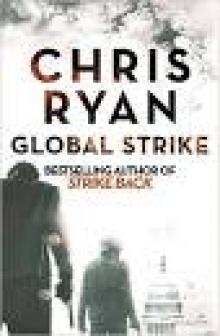 Global Strike
Global Strike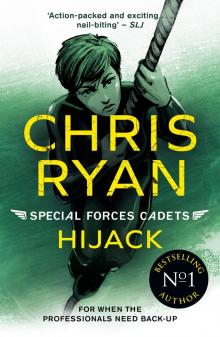 Hijack
Hijack Special Forces Cadets 2
Special Forces Cadets 2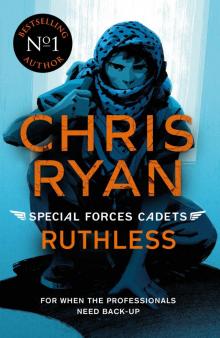 Ruthless
Ruthless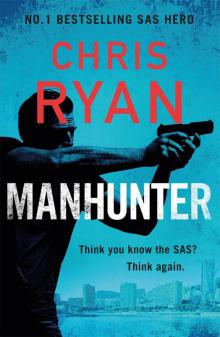 Manhunter
Manhunter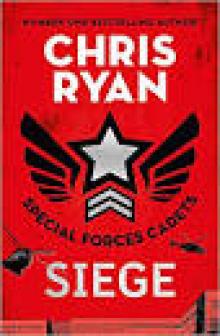 Special Forces Cadets 1
Special Forces Cadets 1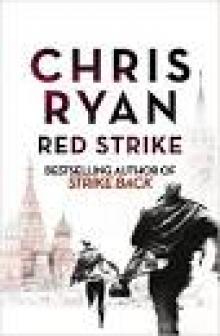 Red Strike
Red Strike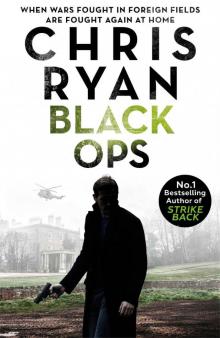 Black Ops
Black Ops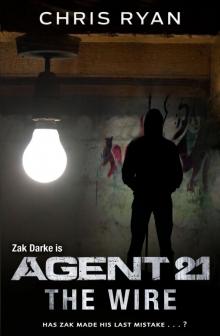 Agent 21: The Wire
Agent 21: The Wire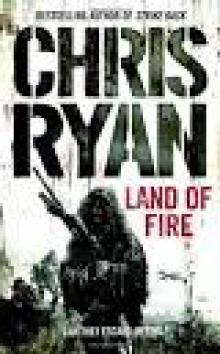 Land of Fire
Land of Fire Alpha Force: Fault Line
Alpha Force: Fault Line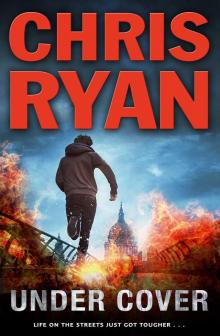 Under Cover (Agent 21)
Under Cover (Agent 21)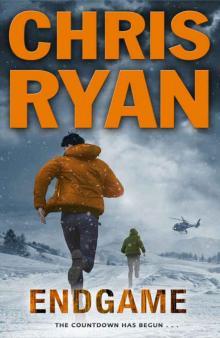 Endgame (Agent 21)
Endgame (Agent 21) Red Centre
Red Centre Blackout
Blackout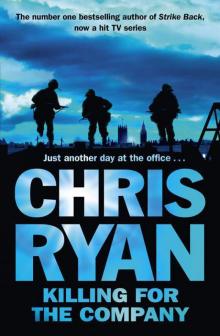 Killing for the Company
Killing for the Company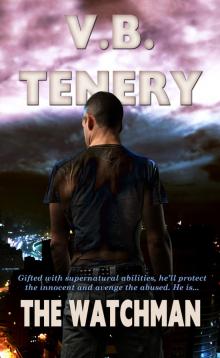 The Watchman
The Watchman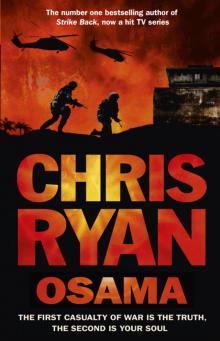 Osama
Osama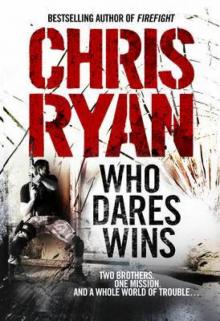 Who Dares Wins
Who Dares Wins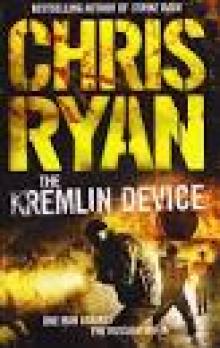 The Kremlin Device
The Kremlin Device Hunter Killer
Hunter Killer Alpha Force: Untouchable
Alpha Force: Untouchable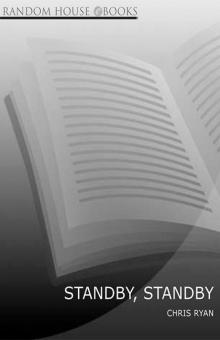 Stand By Stand By
Stand By Stand By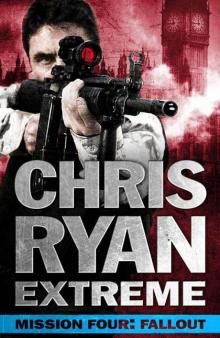 Chris Ryan Extreme: Hard Target: Mission Four: Fallout
Chris Ryan Extreme: Hard Target: Mission Four: Fallout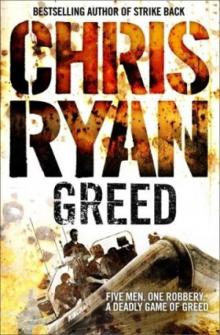 Greed mb-1
Greed mb-1 Alpha Force: Desert Pursuit
Alpha Force: Desert Pursuit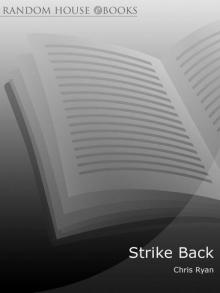 Strike Back
Strike Back Greed
Greed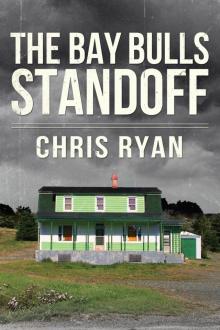 The Bay Bulls Standoff
The Bay Bulls Standoff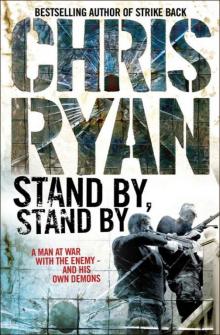 Stand By, Stand By gs-1
Stand By, Stand By gs-1 Outbreak
Outbreak Hunted
Hunted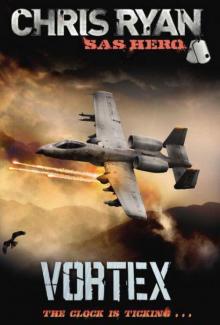 Vortex cr-4
Vortex cr-4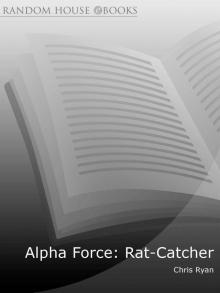 Rat-Catcher
Rat-Catcher Vortex
Vortex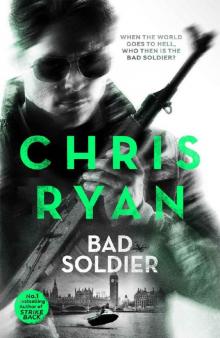 Bad Soldier
Bad Soldier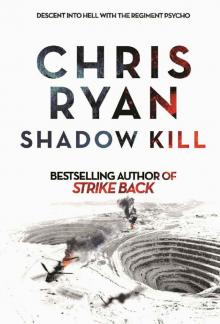 Shadow Kill: A Strikeback Novel
Shadow Kill: A Strikeback Novel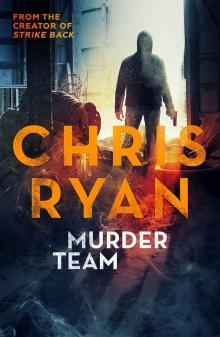 Murder Team (Kindle Single)
Murder Team (Kindle Single) One Good Turn
One Good Turn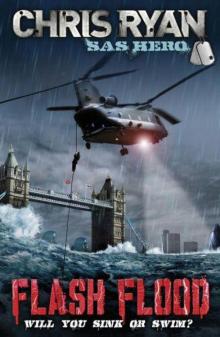 Flash Flood cr-1
Flash Flood cr-1 Night Strike
Night Strike Wildfire
Wildfire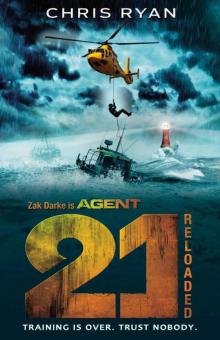 Agent 21: Reloaded: Book 2
Agent 21: Reloaded: Book 2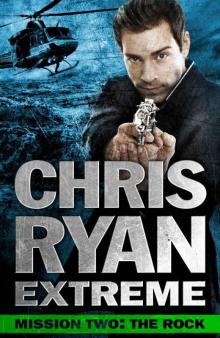 Chris Ryan Extreme: Hard Target: Mission Two: The Rock
Chris Ryan Extreme: Hard Target: Mission Two: The Rock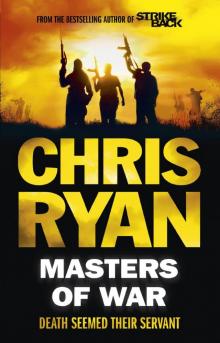 Masters of War
Masters of War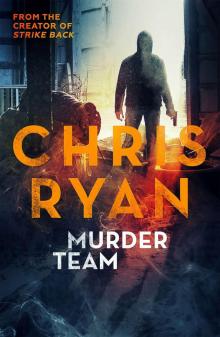 Murder Team
Murder Team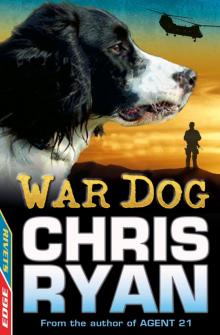 War Dog
War Dog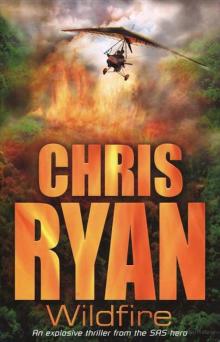 Wildfire cr-2
Wildfire cr-2 Survival
Survival The One That Got Away - Junior edition
The One That Got Away - Junior edition The Hit List
The Hit List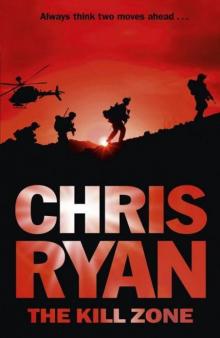 The Kill Zone
The Kill Zone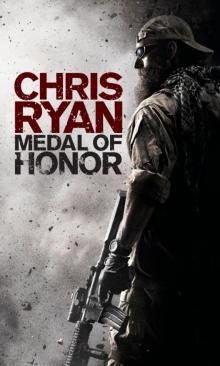 Medal of Honor
Medal of Honor Battleground
Battleground Twister
Twister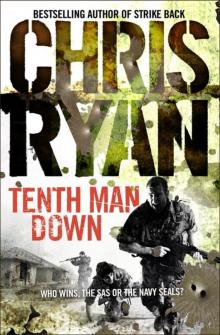 Tenth Man Down gs-4
Tenth Man Down gs-4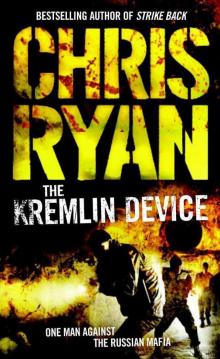 The Kremlin Device gs-3
The Kremlin Device gs-3 Hostage
Hostage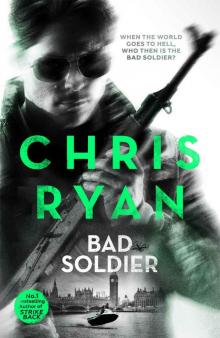 Bad Soldier: Danny Black Thriller 4
Bad Soldier: Danny Black Thriller 4 Alpha Force: Blood Money
Alpha Force: Blood Money Firefight
Firefight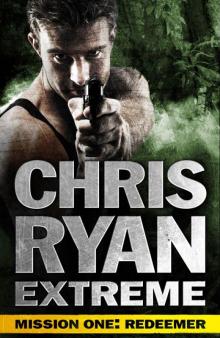 Chris Ryan Extreme: Hard Target: Mission One: Redeemer
Chris Ryan Extreme: Hard Target: Mission One: Redeemer Hit List
Hit List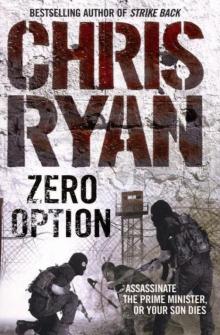 Zero Option gs-2
Zero Option gs-2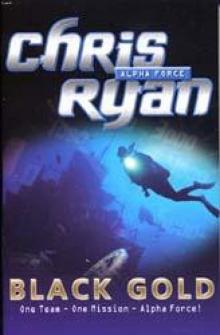 Black Gold
Black Gold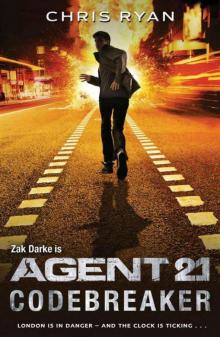 Agent 21: Codebreaker: Book 3
Agent 21: Codebreaker: Book 3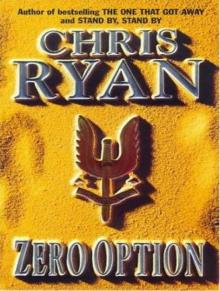 Zero Option
Zero Option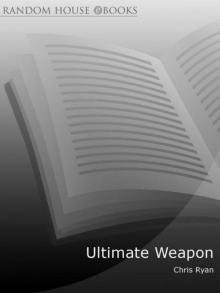 Ultimate Weapon
Ultimate Weapon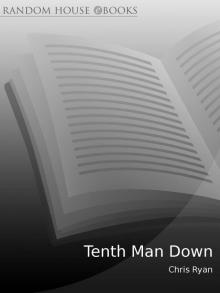 Tenth Man Down
Tenth Man Down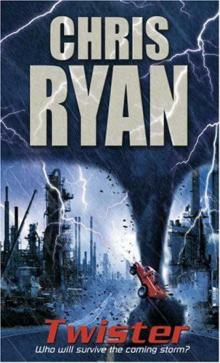 Twister cr-5
Twister cr-5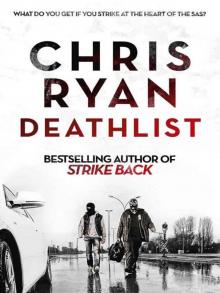 Deathlist
Deathlist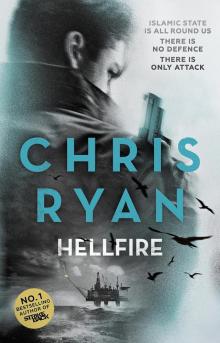 Hellfire
Hellfire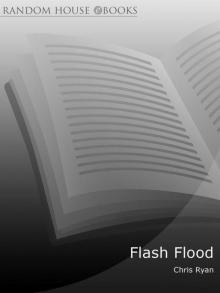 Flash Flood
Flash Flood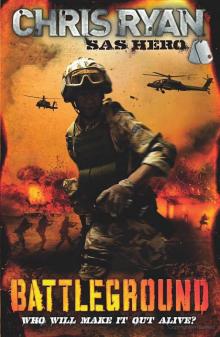 Battleground cr-6
Battleground cr-6 The Increment
The Increment